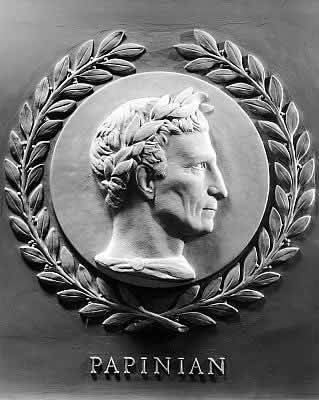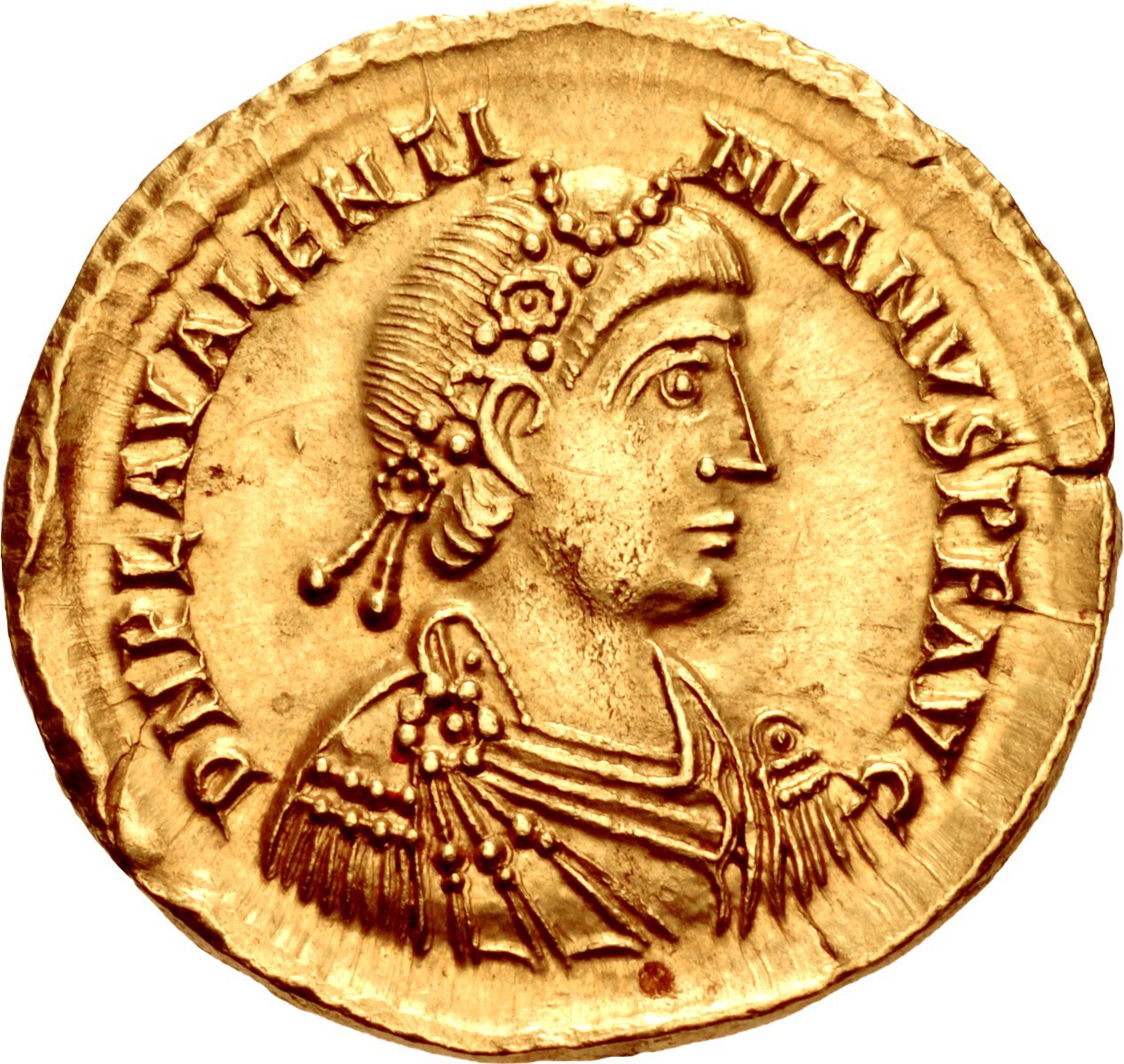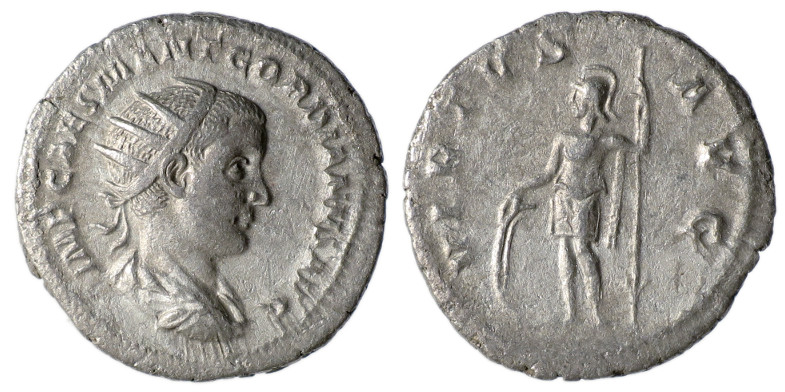|
Modestinus
Herennius Modestinus, or simply Modestinus, was a celebrated Roman jurist, a student of Ulpian who flourished about 250 AD. He appears to have been a native of one of the Greek-speaking provinces, probably Dalmatia. In Valentinian's ''Law of Citations'' he is classed with Papinian, Paulus, Gaius and Ulpian, as one of the five jurists whose recorded views were considered decisive. He is considered to be the last great jurist of the classic age of Roman law. He is mentioned in a rescript of Gordian III in the year 240 in connection with a responsum which he gave to the party to whom the rescript was addressed. No fewer than 345 passages in the ''Digest'' of the ''Corpus Juris Civilis The ''Corpus Juris'' (or ''Iuris'') ''Civilis'' ("Body of Civil Law") is the modern name for a collection of fundamental works in jurisprudence, issued from 529 to 534 by order of Justinian I, Byzantine Emperor. It is also sometimes referred ...'' are taken from his writings. He is the author ... [...More Info...] [...Related Items...] OR: [Wikipedia] [Google] [Baidu] |
Law Of Citations
The Law of Citations (''Lex citationum'') was a Roman law issued from Ravenna in AD 426 by the emperor Valentinian III, or rather by his regent mother, Galla Placidia Augusta, to the Senate and the people of Rome, and it included in both Theodosius II's law compilation of 438 (''Codex Theodosianus'' 1, 4, 3) and the first edition of the ''Codex Justinianus''. It was designed to help judges deal with vast amounts of jurist writings on a subject and thus to reach a decision. According to the legal historian Alan Watson, "This Law of Citations marks a low point of Roman jurisprudence, since t declaresthe correct opinion is to be found by counting heads, not by choosing the best solution". Nonetheless, it was "exhibiting no mean instinct of statesmanship" and may be viewed as an attempt to simplify adjudication in practice, "in opposition to the growing ignorance and ubiquitous corruption and injustice of the times". Authority was given to Ulpianus, Gaius, Paulus, Papinianus and Mo ... [...More Info...] [...Related Items...] OR: [Wikipedia] [Google] [Baidu] |
Julius Paulus
Julius Paulus ( el, Ἰούλιος Παῦλος; fl. 2nd century and 3rd century AD), often simply referred to as Paul in English, was one of the most influential and distinguished Roman jurists. He was also a praetorian prefect under the Roman Emperor Alexander Severus. Life Little is known of the life and family of Paulus; he was a man of Greek descent, who originated from an unknown Phoenician town or from Patavium (modern Padua Italy). The possibility that Paulus could come from Patavium is based on a statue with an inscription found in Patavium dedicated to a Paulus. During the reign of emperors Septimius Severus and Caracalla, Paulus served as a jurist. He was exiled by the emperor Elagabalus and recalled from exile by his successor, emperor Alexander Severus. Severus and his mother Julia Avita Mamaea in 222, appointed him among the emperor's chief advisers and between 228 and 235, he was the Praetorian prefect of the Praetorian Guard. Paulus was a contemporary of the j ... [...More Info...] [...Related Items...] OR: [Wikipedia] [Google] [Baidu] |
Gaius (jurist)
Gaius (; '' fl.'' AD 130–180) was a Roman jurist. Scholars know very little of his personal life. It is impossible to discover even his full name, Gaius or Caius being merely his personal name ('' praenomen''). As with his name it is difficult to ascertain the span of his life, but it is safe to assume he lived from AD 110 to at least AD 179, since he wrote on legislation passed within that time. From internal evidence in his works it may be gathered that he flourished in the reigns of the emperors Hadrian, Antoninus Pius, Marcus Aurelius and Commodus. His works were thus composed between the years 130 and 180. After his death, however, his writings were recognized as of great authority, and the emperor Theodosius II named him in the ''Law of Citations,'' along with Papinian, Ulpian, Modestinus and Paulus, as one of the five jurists whose opinions were to be followed by judicial officers in deciding cases. The works of these jurists accordingly became most important sou ... [...More Info...] [...Related Items...] OR: [Wikipedia] [Google] [Baidu] |
Roman Law
Roman law is the law, legal system of ancient Rome, including the legal developments spanning over a thousand years of jurisprudence, from the Twelve Tables (c. 449 BC), to the ''Corpus Juris Civilis'' (AD 529) ordered by Eastern Roman emperor Justinian I. Roman law forms the basic framework for Civil law (legal system), civil law, the most widely used legal system today, and the terms are sometimes used synonymously. The historical importance of Roman law is reflected by the continued use of List of legal Latin terms, Latin legal terminology in many legal systems influenced by it, including common law. After the dissolution of the Western Roman Empire, the Roman law remained in effect in the Eastern Roman Empire. From the 7th century onward, the legal language in the East was Greek. ''Roman law'' also denoted the legal system applied in most of Western Europe until the end of the 18th century. In Germany, Roman law practice remained in place longer under the Holy Roman Empire ( ... [...More Info...] [...Related Items...] OR: [Wikipedia] [Google] [Baidu] |
Papinian
Aemilius Papinianus (; grc, Αἰμίλιος Παπινιανός; 142 CE–212 CE), simply rendered as Papinian () in English, was a celebrated Roman jurist, ''magister libellorum'', attorney general (''advocatus fisci'') and, after the death of Gaius Fulvius Plautianus in 205 CE, praetorian prefect. Papinian was one of the most revered jurists in ancient Rome, as third year law students were given the title "''Papinianistae''" (meaning "they that are worthy to study Papinian"). In his time, he had been called "the Asylum of Right and Treasurer of the Laws". Along with Gaius, Paulus, Modestinus and Ulpian, he was made one of the five jurists whose recorded views were considered decisive by the Law of Citations of 426 CE; their views would later be considered the only suitable ones to be cited as primary sources for the ''Codex Theodosianus'' and the ''Corpus Juris Civilis'', provided that Papinian's views prevailed whenever those of the four other jurists were not congruen ... [...More Info...] [...Related Items...] OR: [Wikipedia] [Google] [Baidu] |
Ulpian
Ulpian (; la, Gnaeus Domitius Annius Ulpianus; c. 170223? 228?) was a Roman jurist born in Tyre. He was considered one of the great legal authorities of his time and was one of the five jurists upon whom decisions were to be based according to the Law of Citations of Valentinian III. Biography The exact time and place of his birth are unknown, but the period of his literary activity was between AD 211 and 222. He made his first appearance in public life as assessor in the auditorium of Papinian and member of the council of Septimius Severus; under Caracalla he was master of the requests (''magister libellorum''). Elagabalus (also known as Heliogabalus) banished him from Rome, but on the accession of Severus Alexander (222) he was reinstated, and finally became the emperor's chief adviser and ''Praefectus Praetorio''. During the Severan dynasty, the position of Praetorian prefect in Italy came increasingly to resemble a general administrative post, and there was a tendency to ap ... [...More Info...] [...Related Items...] OR: [Wikipedia] [Google] [Baidu] |
Greek Language
Greek ( el, label=Modern Greek, Ελληνικά, Elliniká, ; grc, Ἑλληνική, Hellēnikḗ) is an independent branch of the Indo-European family of languages, native to Greece, Cyprus, southern Italy (Calabria and Salento), southern Albania, and other regions of the Balkans, the Black Sea coast, Asia Minor, and the Eastern Mediterranean. It has the longest documented history of any Indo-European language, spanning at least 3,400 years of written records. Its writing system is the Greek alphabet, which has been used for approximately 2,800 years; previously, Greek was recorded in writing systems such as Linear B and the Cypriot syllabary. The alphabet arose from the Phoenician script and was in turn the basis of the Latin, Cyrillic, Armenian, Coptic, Gothic, and many other writing systems. The Greek language holds a very important place in the history of the Western world. Beginning with the epics of Homer, ancient Greek literature includes many works of lasting impo ... [...More Info...] [...Related Items...] OR: [Wikipedia] [Google] [Baidu] |
Dalmatia (Roman Province)
Dalmatia was a Roman province. Its name is derived from the name of an Illyrian tribe called the Dalmatae, which lived in the central area of the eastern coast of the Adriatic Sea. It encompassed the northern part of present-day Albania, much of Croatia, Bosnia and Herzegovina, Montenegro, Kosovo and Serbia, thus covering an area significantly larger than the current Croatian region of Dalmatia. Originally this region was called Illyria (in Greek) or Illyricum (in Latin). The province of Illyricum was dissolved and replaced by two separate provinces: Dalmatia and Pannonia. Conquest The region which ran along the coast of the Adriatic Sea and extended inland on the Dinaric Alps was called Illyria by the Greeks. Originally, the Romans also called the area Illyria and later, Illyricum. The Romans fought three Illyrian Wars (229 BC, 219/8 BC and 168 BC) mainly against the kingdom of the Ardiaei to the south of the region. In 168 BC, they abolished this kingdom and divided it into thr ... [...More Info...] [...Related Items...] OR: [Wikipedia] [Google] [Baidu] |
Valentinian III
Valentinian III ( la, Placidus Valentinianus; 2 July 41916 March 455) was Roman emperor in the West from 425 to 455. Made emperor in childhood, his reign over the Roman Empire was one of the longest, but was dominated by powerful generals vying for power amid civil wars and the invasions of Late Antiquity's Migration Period, including the campaigns of Attila the Hun. He was the son of Galla Placidia and Constantius III, and as the great-grandson of Valentinian I () he was the last emperor of the Valentinianic dynasty. As a grandson of Theodosius I (), Valentinian was also a member of the Theodosian dynasty, to which his wife, Licinia Eudoxia, also belonged. A year before assuming the rank of ''augustus'', Valentinian was given the imperial rank of ''caesar'' by his half-cousin and co-emperor Theodosius II (). The '' augusta'' Galla Placidia had great influence during her son's rule. During his early reign Aetius, Felix, and the ''comes africae'', Bonifacius all competed ... [...More Info...] [...Related Items...] OR: [Wikipedia] [Google] [Baidu] |
Gordian III
Gordian III ( la, Marcus Antonius Gordianus; 20 January 225 – February 244) was Roman emperor from 238 to 244. At the age of 13, he became the youngest sole emperor up to that point (until Valentinian II in 375). Gordian was the son of Antonia Gordiana and Junius Balbus, who died before 238. Antonia Gordiana was the daughter of Emperor Gordian I and younger sister of Emperor Gordian II. Very little is known of his early life before his acclamation. Gordian had assumed the name of his maternal grandfather in 238. Rise to power In 235, following the murder of Emperor Alexander Severus in Moguntiacum (modern Mainz), the capital of the Roman province Germania Superior, Maximinus Thrax was acclaimed emperor. In the following years, there was a growing opposition against Maximinus in the Roman Senate and amongst the majority of the population of Rome. In 238, a rebellion broke out in the Africa Province, where Gordian's grandfather and uncle, Gordian I and II, were proclaimed jo ... [...More Info...] [...Related Items...] OR: [Wikipedia] [Google] [Baidu] |
Responsum
''Responsa'' (plural of Latin , 'answer') comprise a body of written decisions and rulings given by legal scholars in response to questions addressed to them. In the modern era, the term is used to describe decisions and rulings made by scholars in historic religious law. In the Roman Empire Roman law recognised , i.e., the responses and thoughts of jurists, as one of the sources of (written law), along with laws originating from magistrates, from the Senate, or from the emperor. A particularly well-known and highly influential example of such ''responsa'' was the ''Digesta'' (or ''Digests''), in 90 books, the principal work of the prominent second century jurist Salvius Julianus. This was a systematic treatise on civil and praetorian law, consisting of responsa on real and hypothetical cases, cited by many later Roman legal writers. In the Catholic Church In the Catholic Church, ''responsa'' are answers of the competent executive authority to specific questions (in Latin, ''dub ... [...More Info...] [...Related Items...] OR: [Wikipedia] [Google] [Baidu] |
Corpus Juris Civilis
The ''Corpus Juris'' (or ''Iuris'') ''Civilis'' ("Body of Civil Law") is the modern name for a collection of fundamental works in jurisprudence, issued from 529 to 534 by order of Justinian I, Byzantine Emperor. It is also sometimes referred to metonymically after one of its parts, the Code of Justinian. The work as planned had three parts: the ''Code'' (''Codex'') is a compilation, by selection and extraction, of imperial enactments to date; the '' Digest'' or ''Pandects'' (the Latin title contains both ''Digesta'' and ''Pandectae'') is an encyclopedia composed of mostly brief extracts from the writings of Roman jurists; and the ''Institutes'' (''Institutiones'') is a student textbook, mainly introducing the ''Code'', although it has important conceptual elements that are less developed in the ''Code'' or the ''Digest''. All three parts, even the textbook, were given force of law. They were intended to be, together, the sole source of law; reference to any other source, inclu ... [...More Info...] [...Related Items...] OR: [Wikipedia] [Google] [Baidu] |
.jpg)






.jpg)